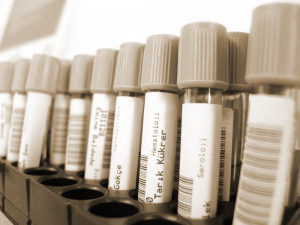Polycystic Ovary Syndrome is the most common cause for ovulatory dysfunction in reproductive-age women, affecting about 8% of that population. Often with a genetic basis, a woman will have a 35-40% chance of having the syndrome if her mother or sister is affected.
 Adult-onset diabetes is also common in the family. Insulin resistance has been found in many women with PCOS. This results in elevated levels of insulin in the bloodstream, which increases androgen levels in the ovary and circulation, preventing ovulation and causing many of the signs and symptoms of the syndrome.
Adult-onset diabetes is also common in the family. Insulin resistance has been found in many women with PCOS. This results in elevated levels of insulin in the bloodstream, which increases androgen levels in the ovary and circulation, preventing ovulation and causing many of the signs and symptoms of the syndrome.
Signs and symptoms include the absence of, or irregular menses, with accompanying infertility due to lack of ovulation; obesity, which occurs in 35-65%, often happening before the onset of puberty; and hirsutism, characterized by dark, coarse hair located on the face, chest, abdomen and inner thighs.
Weight reduction of as little as 5-7% can improve insulin sensitivity, and as a result, reduce the androgens, and restore ovulatory cycles, often leading to fertility. Metformin is a medication that may be added to assist in improving insulin sensitivity and weight loss.
Absence of ovulatory menstrual cycles can lead to pre-cancerous changes in the uterine lining. Therefore, synthetic progestins to start menses, oral contraceptives, or medications to induce ovulation should be considered. Patients with polycystic ovaries may be more sensitive to oral or injectable fertility medications and should be used under close medical supervision.
